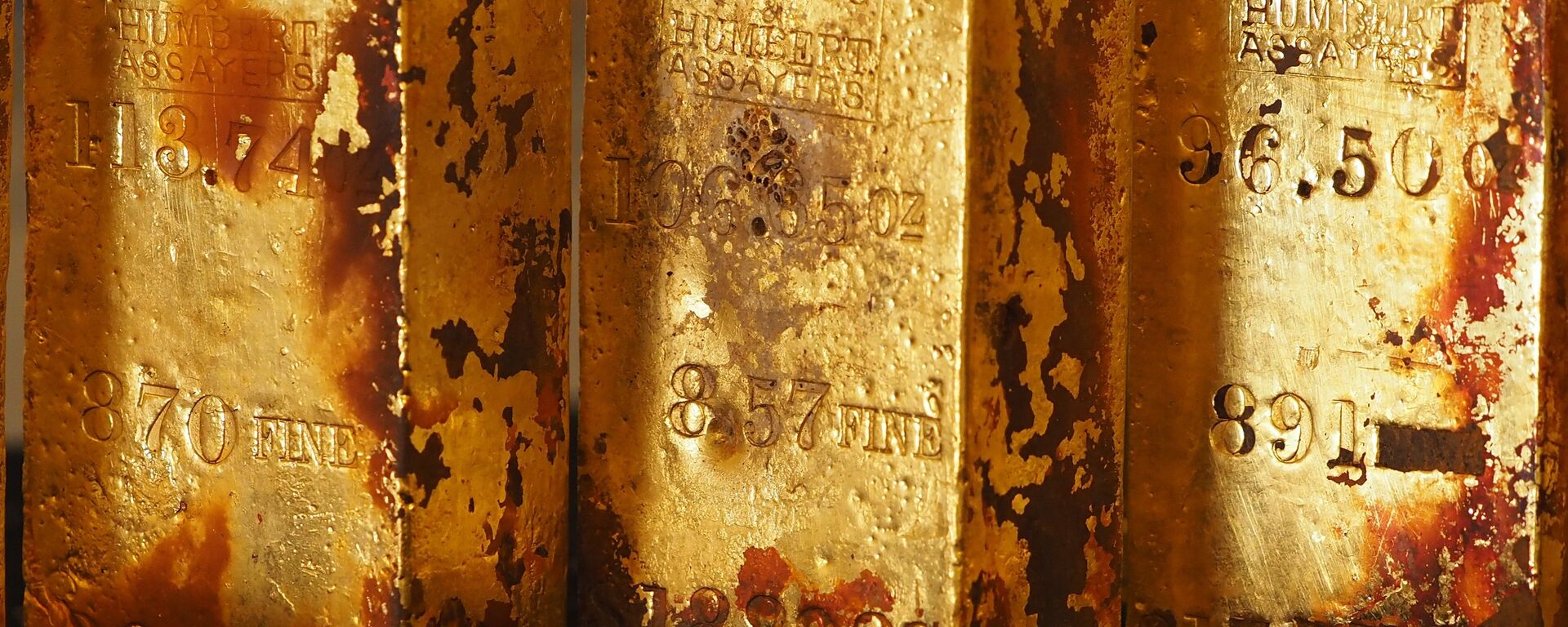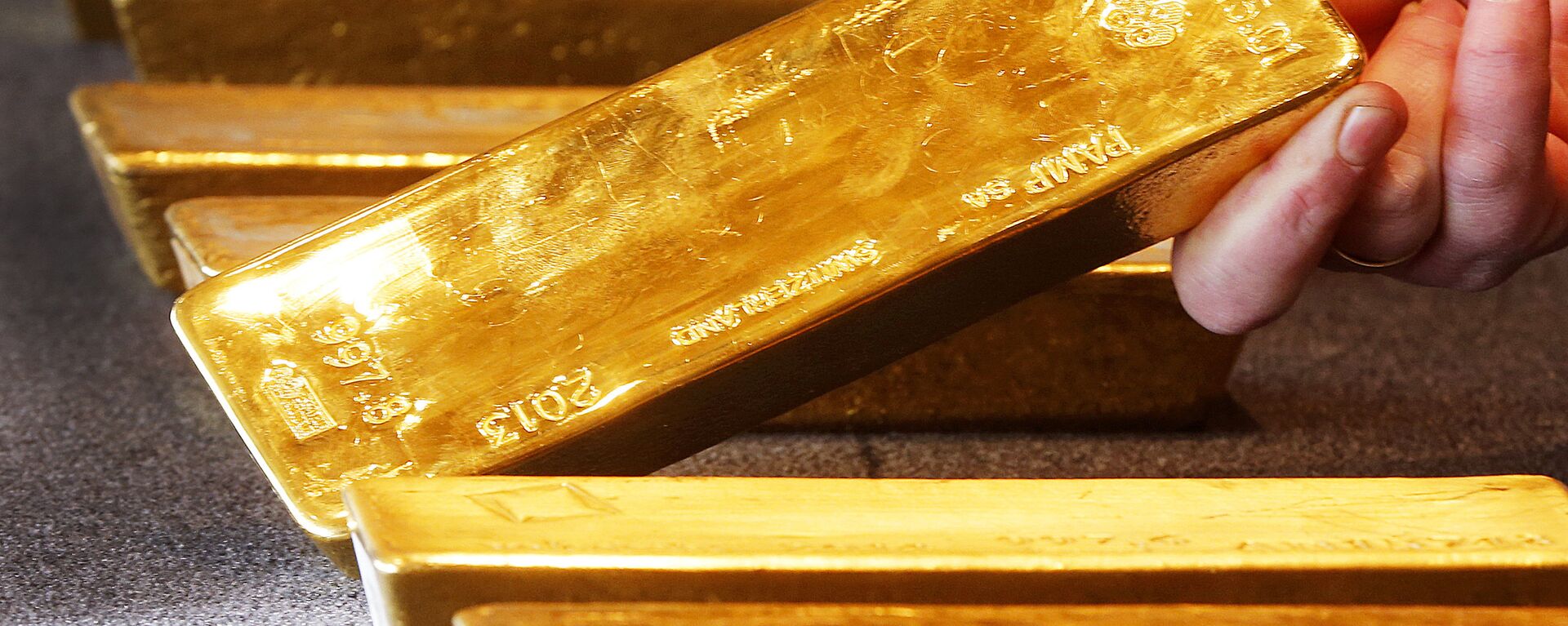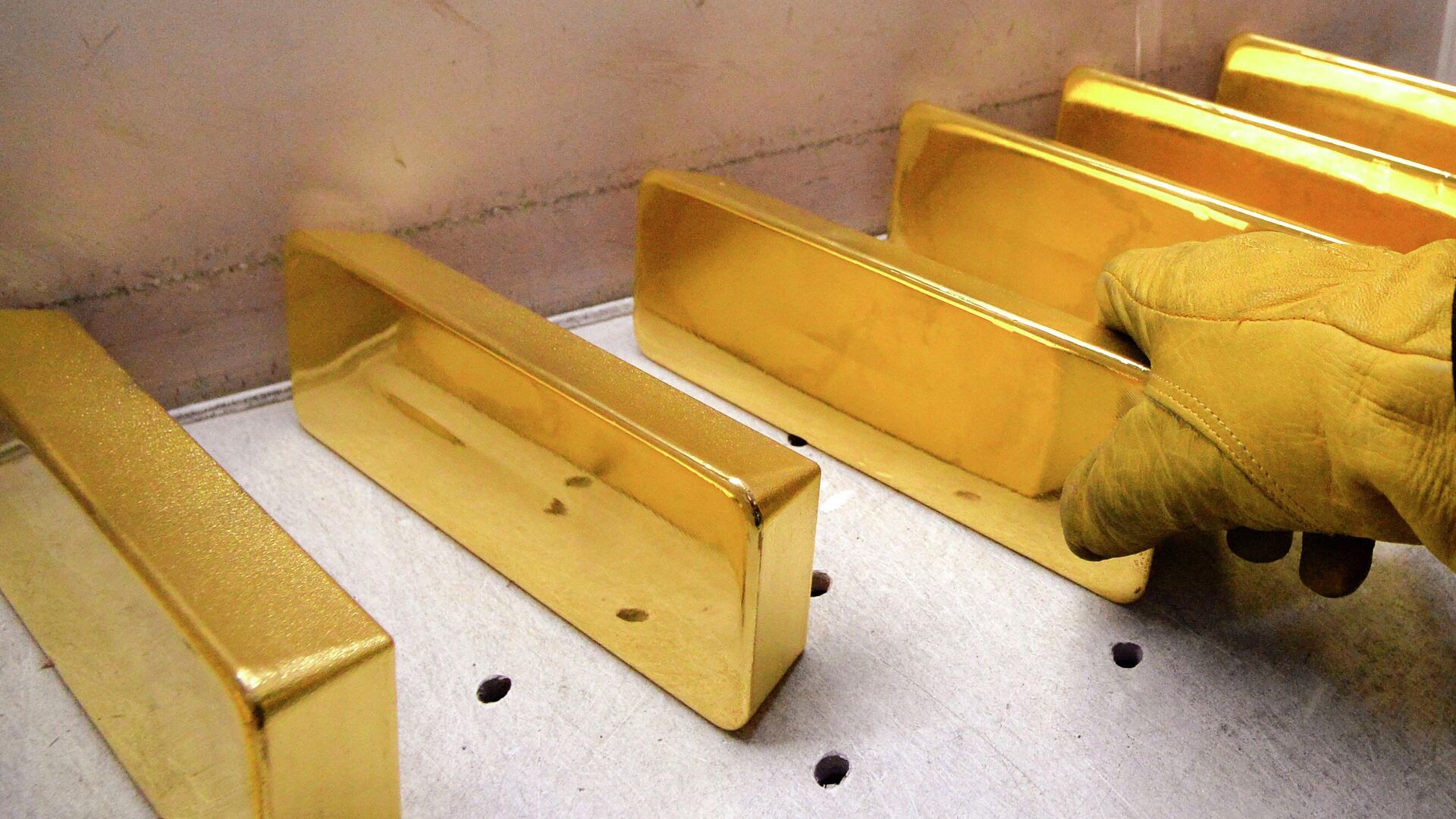https://sputnikglobe.com/20230918/china-lifts-gold-import-restrictions-sparks-surge-in-yuans-resilience-1113467679.html
China Lifts Gold Import Restrictions, Sparks Surge in Yuan's Resilience
China Lifts Gold Import Restrictions, Sparks Surge in Yuan's Resilience
Sputnik International
China's bid to boost the renminbi has led to a surge in domestic gold prices and put a strain on the currency, prompting the PBoC to strengthen its currency as gold demand remains robust. Anticipation is high for another surge in demand ahead of its traditional bridal festivities in October.
2023-09-18T16:42+0000
2023-09-18T16:42+0000
2023-09-18T16:42+0000
economy
china
shanghai
london
people's bank of china (pboc)
world gold council
https://cdn1.img.sputnikglobe.com/img/07e7/08/09/1112487926_0:131:2648:1621_1920x0_80_0_0_5a95dec92078fc8781f9502d85a4ea2b.jpg
In a strategic move aimed at shoring up the Chinese yuan renminbi (CNY), the People’s Bank of China (PBoC) has rescinded the temporary restrictions on gold imports previously imposed on select lenders. While intended to safeguard the national currency, this decision inadvertently led to an uptick in the price of the coveted metal within the nation.According to market-quoted price calculations, the difference between the Shanghai gold price and its London counterpart reached an unusual $121 per troy ounce last Thursday.As per insiders privy to an unofficial communication directed at specific state and midsize commercial banks, the spread shrank to $76 this Monday. The recent relaxation of regulations on precious metal imports by the Chinese Central Bank prompted the adjustment.In August, China implemented a measure to curtail and eventually halt the allocation of quotas for international gold imports by financial institutions. This decision was made to counteract a surge in purchasing activity driven by concerns over a potential depreciation of the yuan. Early September saw China’s currency reach its lowest point against the dollar in 16 years, a move triggered by released economic figures.The Central Bank regulates the domestic gold market's inflow through a framework of assigned rations provided to commercial banks. This tool subtly modulates the flow of metal resources, eventually steering market dynamics.Since the onset of July, the spread in gold prices has exhibited a steady increase. Individuals privy to trading circles and regulatory affairs have pointed out that this uptick in premium is partly a consequence of the implemented import constraints.China firmly holds its position as one of the world's leading gold buyers, continuously boosting its reserves. In August, the People's Bank of China reported its 10th consecutive month of gold procurement.This year, China has imported nearly 900 metric tons of gold, reaching its highest point in half a decade. Gold makes up about 1.38 percent of China's extensive foreign exchange reserves, tallying at $3.16 trillion.Anticipation is high for a leap in gold demand in China as the country gears up for the forthcoming traditional nuptial season in October.While international observers of the gold market maintain a watchful posture, a palpable caution surrounds the extended forecast. This levelheadedness stems from a discernible weakening in investment and jewelry demand, alongside a trend of central banks worldwide scaling down their acquisitions from previously elevated levels.Carsten Menke, an analyst at Julius Baer, expressed his viewpoint by stating, “In our view, this is at odds with prices above $1,900 per ounce. The resilient global economy is not yet fully reflected in the market, as some still consider a recession as very likely.”
https://sputnikglobe.com/20230820/is-it-a-good-idea-to-invest-in-gold-1112742707.html
https://sputnikglobe.com/20180902/expert-invest-gold-1067689871.html
china
shanghai
london
Sputnik International
feedback@sputniknews.com
+74956456601
MIA „Rosiya Segodnya“
2023
Chimauchem Nwosu
https://cdn1.img.sputnikglobe.com/img/07e7/09/01/1113046371_0:99:1536:1635_100x100_80_0_0_9c5c627283eca931c39fe4852bbb301c.jpg
Chimauchem Nwosu
https://cdn1.img.sputnikglobe.com/img/07e7/09/01/1113046371_0:99:1536:1635_100x100_80_0_0_9c5c627283eca931c39fe4852bbb301c.jpg
News
en_EN
Sputnik International
feedback@sputniknews.com
+74956456601
MIA „Rosiya Segodnya“
Sputnik International
feedback@sputniknews.com
+74956456601
MIA „Rosiya Segodnya“
Chimauchem Nwosu
https://cdn1.img.sputnikglobe.com/img/07e7/09/01/1113046371_0:99:1536:1635_100x100_80_0_0_9c5c627283eca931c39fe4852bbb301c.jpg
people's bank of china, renminbi, gold imports, shanghai gold price, london gold price, currency depreciation, chinese yuan, international gold imports, gold market, capital flight, bullion market, foreign exchange reserves, traditional nuptial season, gold accessories, global economy, recession, china, united states, world gold council, guangzhou, gf futures, julius baer.
people's bank of china, renminbi, gold imports, shanghai gold price, london gold price, currency depreciation, chinese yuan, international gold imports, gold market, capital flight, bullion market, foreign exchange reserves, traditional nuptial season, gold accessories, global economy, recession, china, united states, world gold council, guangzhou, gf futures, julius baer.
China Lifts Gold Import Restrictions, Sparks Surge in Yuan's Resilience
China's bid to boost the renminbi has led to a surge in domestic gold prices and put a strain on the currency, prompting the PBoC to strengthen its currency as gold demand remains robust. Anticipation is high for another surge in demand ahead of its traditional bridal festivities in October.
In a strategic move aimed at shoring up the Chinese yuan renminbi (CNY), the People’s Bank of China (PBoC) has rescinded the temporary restrictions on gold imports previously imposed on select lenders. While intended to safeguard the national currency, this decision inadvertently led to an uptick in the price of the coveted metal within the nation.
According to market-quoted price calculations, the difference between the Shanghai
gold price and its London counterpart reached an unusual $121 per troy ounce last Thursday.
As per insiders privy to an unofficial communication directed at specific state and midsize commercial banks, the spread shrank to $76 this Monday. The recent relaxation of regulations on precious metal imports by the Chinese Central Bank prompted the adjustment.
In August, China implemented a measure to curtail and eventually halt the allocation of quotas for international gold imports by financial institutions. This decision was made to counteract a surge in purchasing activity
driven by concerns over a potential depreciation of the yuan. Early September saw China’s currency
reach its lowest point against the dollar in 16 years, a move triggered by released economic figures.

20 August 2023, 17:14 GMT
The Central Bank regulates the domestic gold market's inflow through a framework of assigned rations provided to commercial banks. This tool subtly modulates the flow of metal resources, eventually steering market dynamics.
Since the onset of July, the spread in gold prices has exhibited a steady increase. Individuals privy to trading circles and regulatory affairs have pointed out that this uptick in premium is partly a consequence of the implemented import constraints.
“Improving gold demand and relatively tepid imports in recent months may have led to local demand and supply conditions tightening, pushing up the local gold price premium,” expressed the World Gold Council in a publication last week, without delving into the details of import restrictions.
China firmly holds its position as one of the world's leading gold buyers, continuously boosting its reserves. In August, the People's Bank of China reported its 10th consecutive month of gold procurement.

2 September 2018, 15:28 GMT
This year, China has imported nearly 900 metric tons of gold, reaching its highest point in half a decade. Gold makes up about 1.38 percent of China's extensive foreign exchange reserves, tallying at $3.16 trillion.
Anticipation is high for a leap in gold demand in China as the country gears up for the forthcoming traditional nuptial season in October.
“With the National Holiday looming, the demand and consumption for gold accessories will continue to rise,” according to Ye Qianning, an analyst with GF Futures in Guangzhou.
While international observers of the gold market maintain a watchful posture, a palpable caution surrounds the extended forecast. This levelheadedness stems from a discernible weakening in investment and jewelry demand, alongside a trend of central banks worldwide scaling down their acquisitions from previously elevated levels.
Carsten Menke, an analyst at Julius Baer, expressed his viewpoint by stating, “In our view, this is at odds with prices above $1,900 per ounce. The resilient global economy is not yet fully reflected in the market, as some still consider a recession as very likely.”







